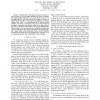Free Online Productivity Tools
i2Speak
i2Symbol
i2OCR
iTex2Img
iWeb2Print
iWeb2Shot
i2Type
iPdf2Split
iPdf2Merge
i2Bopomofo
i2Arabic
i2Style
i2Image
i2PDF
iLatex2Rtf
Sci2ools
ICCAD
2004
IEEE
2004
IEEE
The effects of energy management on reliability in real-time embedded systems
Abstract—The slack time in real-time systems can be used by recovery schemes to increase system reliability as well as by frequency and voltage scaling techniques to save energy. Moreover, the rate of transient faults (i.e., soft errors caused, for example, by cosmic ray radiations) also depends on system operating frequency and supply voltage. Thus, there is an interesting trade-off between system reliability and energy consumption. This paper first investigates the effects of frequency and voltage scaling on the fault rate and proposes two fault rate models based on previously published data. Then, the effects of energy management on reliability is studied. Our analysis results show that, energy management through frequency and voltage scaling could dramatically reduce system reliability, and ignoring the effects of energy management on the fault rate is too optimistic and may lead to unsatisfied system reliability.
Related Content
| Added | 16 Mar 2010 |
| Updated | 16 Mar 2010 |
| Type | Conference |
| Year | 2004 |
| Where | ICCAD |
| Authors | Dakai Zhu, Rami G. Melhem, Daniel Mossé |
Comments (0)

